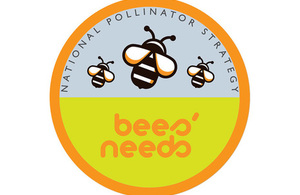Boost for bees thanks to new projects for pollinators
Environment Minister George Eustice speaks at Bee Summit about range of pollinators initiatives.

Thousands of people are signing up to schemes to create new habitats for bees and pollinators as part of the government’s National Pollinator Strategy, George Eustice will announce today.
A year on from the launch of the Strategy, which aims to protect pollinators and promote their vital contribution to the countryside and our economy, a range of initiatives have been launched by environmental groups, retailers and schools to help pollinators flourish.
Schemes include conservation charity Buglife, with funding from Biffa Award, setting up 800 ‘Urban Buzz’ hotspots. By 2018, these hotspots will occupy 200 hectares, with the support of 800 volunteers and 4,800 people engaged in creation – as well as 80,000 through wider engagement and citizen science. Eight cities have signed up and plans will be unveiled at the end of November.
For two years running, supermarket chain Waitrose has been including the ‘Bees Needs’ logo - which sets out the five simple ways everyone can help pollinators - on its pollinator-friendly plants like asters, cosmos and geraniums.
Defra has also provided £20,000 in grants to five Local Nature Partnership projects in Hertfordshire, Lancashire, Lincolnshire, Durham and Surrey. These projects will support schools and museums to develop pollinator friendly courses, promote ecological understanding and awareness of where our food comes from, create roadside habitats for our bees and butterflies and, ultimately, help the next generation become better connected to nature than ours is.
Speaking at a Bee Summit organised by Friends of the Earth and the Women’s Institute, Environment Minister George Eustice said
Protecting our pollinators is a priority for this government. They are an essential part of our environment and play a crucial role in food production.
Our National Pollinator Strategy highlighted that everyone, be they landowners, councils, or window-box gardeners can do their bit to give a boost to our bees. The range of outstanding initiatives that have since taken off are a great testament to our country’s commitment to improving our environment and helping bees and other pollinators thrive
The range of initiatives that partners in the National Pollinator Strategy are delivering is set out in a new implementation plan published today. Other examples of progress include:
- The Bumblebee Conservation Trust is aiming to sign up 2,000 volunteers by 2019 to engage the public on pollinator friendly projects;
- The RHS’ Perfect for Pollinators initiative has created plant lists to help gardeners identify plants that will provide nectar and pollen for bees and the many other types of pollinating insects; and
- Defra has also installed two beehives on the roof of its building in Westminster, and last month celebrated its first yield of ‘Whitehall Honey’.
The actions in the Plan come under five key themes:
- supporting pollinators on farmland;
- supporting pollinators across towns, cities and the countryside;
- enhancing the response to pest and disease risks;
- raising awareness of what pollinators need to survive and thrive; and
- improving evidence on the status of pollinators and the service they provide.
The National Pollinator Strategy, which was launched last year, encourages everyone to support pollinators – be they major landowners, councils, or window-box gardeners – by taking five simple steps to help pollinators known as the ‘Bees Needs’.
Notes to editors
- The National Pollinator Strategy Implementation Plan is available.
- The Bees’ Needs campaign sets out five simple actions for pollinators: * Grow more flowers, shrubs & trees * Let it grow wild * Cut grass less often * Don’t disturb insect nests and hibernation spots * Think carefully about whether to use pesticides
- For more information on this release, contact Defra press office on 020 7238 6007.